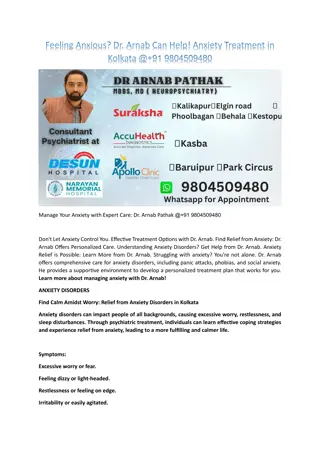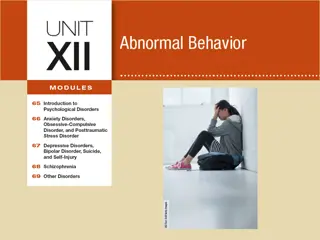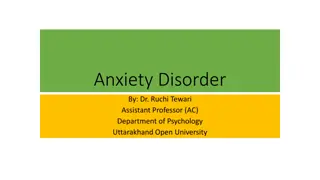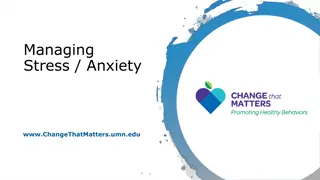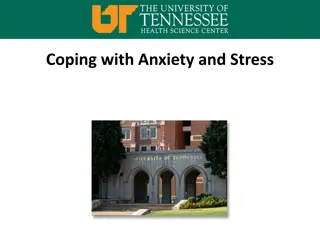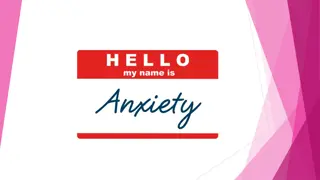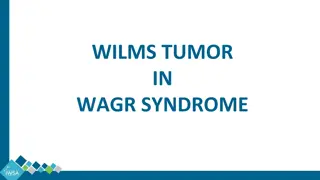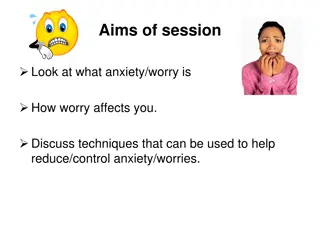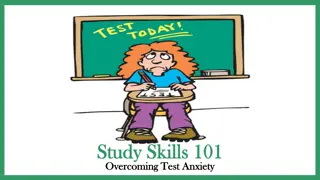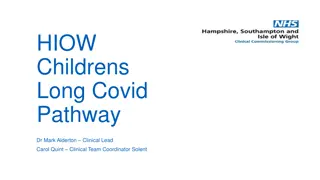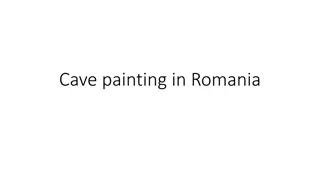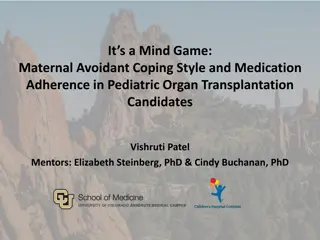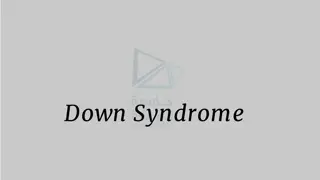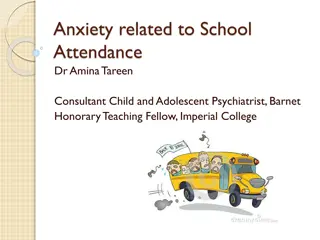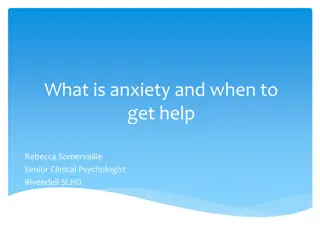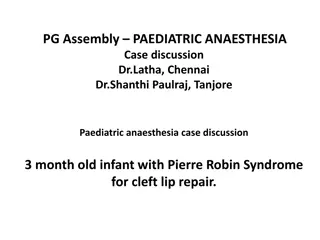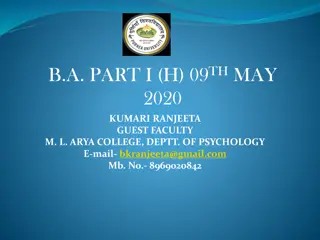Coping with Cave Syndrome and Anxiety Post-COVID-19
Understand Cave Syndrome, a term signifying fear and anxiety of rejoining society after the pandemic, and how to manage it. Learn to accept normalcy of anxiety, seek accurate information, avoid overload, and intentionally unplug to maintain mental wellbeing.
Download Presentation

Please find below an Image/Link to download the presentation.
The content on the website is provided AS IS for your information and personal use only. It may not be sold, licensed, or shared on other websites without obtaining consent from the author.If you encounter any issues during the download, it is possible that the publisher has removed the file from their server.
You are allowed to download the files provided on this website for personal or commercial use, subject to the condition that they are used lawfully. All files are the property of their respective owners.
The content on the website is provided AS IS for your information and personal use only. It may not be sold, licensed, or shared on other websites without obtaining consent from the author.
E N D
Presentation Transcript
Cave Syndrome and Anxiety Moving Forward
What is Cave Syndrome? A non-medical term coined by psychiatrist Dr. Arthur Bregman. Basically it is the fear and anxiety of going out and re-joining society post COVID-19 pandemic. Ranges from extreme fear to simply being uncomfortable. This fear can jeopardize your life and your career. Some hesitancy is normal, but Clinically severe cases where you are not able to leave your house, you should be seeking professional help to alleviate these anxieties.
Understanding the Process Watch this 6 minute video to help you understand the risks and your decision process: https://www.wsj.com/articles/fully-vaccinated-but-anxious-about- a-return-to-normal-life-you-may-have-cave-syndrome- 11626870612?mod=e2fb&fbclid=IwAR0snoXd- MxKY2_w9sVv014V3X3cAJDkiVSZCuTeXXZ4cxWhIPRlVgvUdGo
Take the quiz: https://coronaphobia.org/list/ COVID Stress Scale
Accept that Anxiety and Fear are Normal COVID-19 is new and we continue to learn new information as it evolves. This can cause anxiety and fear. A healthy amount of anxiety can be normal: It can motivate us to protect ourselves and others. It can motivate us to learn more about the virus.
Seek Credible Information There is a plethora of information out there on COVID-19. Ensure it is accurate information by going to credible sources such as: The World Health Organization Government of Nova Scotia Health Canada Avoid unfamiliar websites and online discussion groups, as they are generally opinions, not facts. Be cautious of social media and information on these sites as they may not be reliable sources.
Avoid Information Overload Limit checking sources of COVID-19 to once or twice a day. Too much information is not always beneficial to our mental health. This includes news, media, research articles, etc. Information continues to shift rapidly, but daily changes of information will not impact your risk assessment.
Intentionally Unplug Disconnect from all electronics including phones, computers, social media, and tablets. During these times, avoid social media and news. Do something healthy for your mental and physical well-being such as exercise, read, go for a walk in nature, etc.
Deal with any Problems with a Process Small problems may become overwhelming. Identify which concerns are truly problems. Some of your worries that you are experiencing may not be problems that need resolving. See the following link for steps to resolve issues that arise: https://www.camh.ca/- /media/files/camh_covid19_infosheet- dealing_with_problems-pdf.pdf
Assess Your Stress Levels Understand your stress levels. When people experience too much stress, they feel a loss of control, worry excessively, experience negative emotions, and subsequently get overwhelmed. To increase your coping capacity, you need to decrease your stress levels and identify your strengths. Try following the quiz below to help with assessing your perceived stress: https://edc.camhx.ca/redcap/surveys/?s=MJYMXW9LTH How much stress is too much quiz: https://edc.camhx.ca/redcap/surveys/?s=N93X9NLEXX
Be Careful of the What Ifs? How will I cope IF I get sick? These can cause you to focus on the negatives and you may not be able to identify positives or solutions. During stressful times, people overestimate the negatives in situations. The statement above would force people to lay out all the repercussions of illness. What about coping? People are more resilient and have numerous resources that they may not even consider. Family, friends, community, workplace, provincial resources. All can help you cope and develop your abilities for resiliency. Do NOT underestimate your abilities when faced with challenges. Identify your strengths and move forward with focussing on those and building on your existing skills.
Challenge your Anxious Thoughts High anxiety levels are fuelled by our thought processes. Thoughts can be so vivid, you feel they are true, such as: There is nothing I can do or I can t cope with that These thoughts are not facts but you believe them to be true. How do we know if these are true or simply long held beliefs? Try following the link to challenge your worries and anxieties. https://www.camh.ca/-/media/files/camh_covid19_infosheet- challenge_worries-pdf.pdf
Decrease your Other Stressors COVID-19 is unlikely the only source of stress in everyone s life at the moment. Having an abundance of stress can be detrimental to your health. Address stressors that you have control over such as eating right, exercise, sleep, increasing your immunity, mental health-go out for a walk, etc. Practice relaxation and meditation (choose an activity that works for you, start slowly, make it a regular habit). Increase your positive coping strategies (such as staying active, get sufficient sleep, quiet time, etc.). Decrease your negative coping strategies (such as drinking, smoking, etc.). Avoid negativity and negative people.
Moderate Your Caffeine Intake Coffee intake is a daily routine for many. Too much can make your heart race. This can feed your anxieties. Limit and stop your intake of caffeine early in the day to avoid a sleepless or restless night of sleep.
Be Kind to Yourself Remember, you are only human You may forget something. You may not feel better right away. You may just want a break and sleep in. Look after yourself, or it can be difficult to look after your other responsibilities.
Be Realistic If you get symptoms of COVID-19-get tested. Stay home! Do not feel guilty about getting sick- do not place blame. Remember not one preventative strategy for COVID-19 is 100%. A combination of strategies is ideal, but the fact remains, you will never be 100% protected, unless you live in a bubble, so you need to find a way to move forward, to live life in a new normal. Everyone will need to find and implement their own comfort measures and strategies to move forward as restrictions ease. Everyone will be working at their own pace!
Stigma and Discrimination Do not judge others for having a positive diagnosis, it can happen to any one of us. Once restrictions ease, continue to practice your personal strategies to ensure your safety, both mental and physical. See the following link to help with decreasing stigma and discrimination about COVID-19: https://www.camh.ca/en/health- info/mental-health-and-covid-19/stigma-and-prejudice
Facts vs Fear: Follow the link to clarify the facts: https://singingriverhealthsystem.com/cor onavirus/facts-not-fear/
Seek Support Just because you need to physical distance, does not mean you are unable to connect-reach out through: Phone calls, Video chat, Outdoor activities.
I Still Cant Cope! You ve reduced your stress and anxiety levels. You have reached out to loved ones and community, now what? Look for formal support if necessary to help you cope during stressful times. Normal life can cause increased stress and with the addition of a pandemic, life can become overwhelming quick. Try your family doctor, community walk-in clinics, online support groups, distress lines, psychologist, or other health professional. See the next slide for supports in Nova Scotia.
Click on the link to view the employee mental health resources: https://www2.acadiau.ca/files/files/Files%20~%20Security/HealthHurdles/Mental%20Health %20Supports%20Employees.pdf For student mental health resources, please visit our Student Counselling Centre at the following link: https://www2.acadiau.ca/student-life/health-wellness/mental-health.html
Resources A variety of resources: https://coronaphobia.org/public-resources/ Coping with COVID-19 Anxiety https://www.helpguide.org/articles/anxiety/coronavirus- anxiety.htm# 9 tips to help with worries of COVID-19 https://www.nhs.uk/every-mind-matters/coronavirus/covid-19- anxiety-tips/
Resources Canadian Mental Health Association: Coping with COVID-19 https://novascotia.cmha.ca/community-capacity/coping-covid-19/ Protecting People with Disabilities: https://www.canada.ca/en/public-health/services/diseases/2019-novel- coronavirus-infection/guidance-documents/people-with-disabilities.html COVID-19 Self-Help Booklet Series: https://www.camh.ca/en/health-info/mental-health-and-covid-19/faq- and-resources/self-help-booklet-series
References https://news.berkeley.edu/2021/08/03/overcoming-pandemic-cave- syndrome-why-is-it-so-complicated/ https://www.camh.ca//covid19 https://www.camh.ca/en/health-info/mental-health-and-covid- 19/coping-with-stress-and-anxiety https://www.iflscience.com/health-and-medicine/cave-syndrome-the- worry-of-the-world-postlockdown-/ https://www.psychologytoday.com/ca/blog/the-pacific- heart/202105/cave-syndrome-viral-and-social-toxins-and-the-inner-life https://www.scientificamerican.com/article/cave-syndrome-keeps-the- vaccinated-in-social-isolation1/



